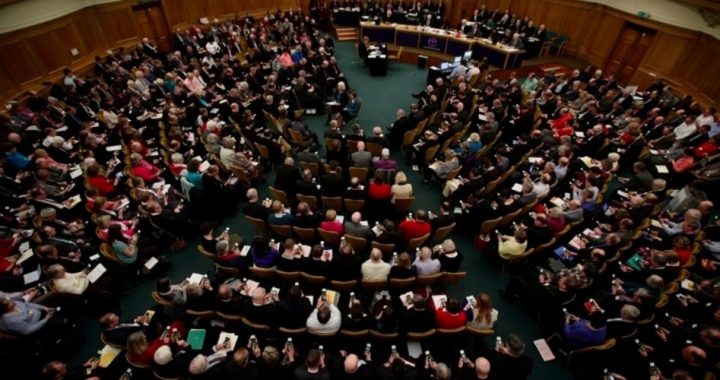
Laity within the Church of England shocked the rest of the denomination November 20 by rejecting a proposal that would have allowed women to serve as bishops in the UK’s official denomination. Following easy passage by both the church’s bishops and clergy, the proposal failed to garner the two-thirds majority needed in the House of Laity for passage, reported Religion News Service, falling by a vote of 132-74 in favor of allowing women bishops.
A church statement explained that the rejection means a closed door to female bishops for the foreseeable future. “The consequence of the ‘no’ vote of terminating any further consideration of the draft legislation means that it will not be possible to introduce draft legislation in the same terms until a new General Synod comes into being in 2015,” the church statement said.
Both Anglican and UK government officials expressed their disappointment in the outcome of the vote, with outgoing Archbishop of Canterbury Dr. Rowan Williams insisting that it somehow represented a blow to the church’s credibility. “Whatever the motivations for voting yesterday,” he said, “whatever the theological principle on which people acted and spoke, the fact remains that a great deal of this discussion is not intelligible to our wider society.” He added that the vote represented a willful blindness on the part of conservative elements in the church “to some of the trends and priorities of wider society. So we have some explaining to do. We have as a result … undoubtedly lost a measure of credibility in our society.”
Williams’ comments appeared to go as far as suggesting that, given the overwhelming desire for women leaders in the church, perhaps the vote might be overridden. “Every day in which we fail to resolve this to our satisfaction … is a day when our credibility in the public eye is likely to diminish,” said the church head. “We have to take that seriously, however uncomfortable that might be. There is a matter of mission here and we can’t afford to hang about. We can’t … indefinitely go on living, simply theologically, with the anomaly of women priests who can not be considered as bishops.”
Prime Minister David Cameron’s office weighed in on the vote, declaring that the prime minister’s “personal view is that there should be women bishops and he shares the disappointment of the Archbishops that the synod is unable to take this forward.” In comments to Parliament after the vote he emphasized that in his mind “the time is right for women bishops…. They need to get on with it, as it were, and get with the program.” He added, however, that “clearly it is for the Church itself to make the decision,” and appeared to give his assurance that the government wouldn’t force the change.
But others within the government offered no such assurance, with some in Parliament insisting that the vote should be overridden. “This is not an issue which can in any way be parked for the next couple of years or so awaiting another round of synod elections,” claimed MP Tony Baldry. He insisted that “this is an issue that has to be resolved as soon as possible…. It is perfectly possible for a different and amended measure to be considered by the General Synod.”
Another MP, Frank Fields, flexed his legislative muscle by introducing a bill to strip the Church of England of its exemption to the UK’s onerous sex-discrimination laws. “Any organization that thinks it can turn its back on half of the talent in the country, and thinks it will be taken seriously, needs some sort of serious wake-up call,” Field said in a BBC radio interview.
Religion News Service reported that the Church of England claims some 3,000 “actively serving women priests,” and that more than 70 percent of the church’s membership are female.
There appeared to be little sympathy within the church hierarchy for those in the denomination who insist that allowing women into leadership positions doesn’t square with Scripture. Several groups with the Church of England led the campaign for rejection of the proposal, saying that it did not give parishes or priests that reject female leadership enough protection or authority to overrule the election of women bishops over them.
“We had hoped for compromise — but the provision being made for us in the draft measure comes nowhere near what we need,” wrote the Rev. Rod Thomas and the Rev. Canon Simon Killwick, two key leaders of the opposition. The duo said that they had the support of no less that 325 priests in the Church of England, and argued that allowing women bishops “will do much more harm in the long term and will lead irrevocably to deep fractures appearing within the Church.”
Writing on VirtueOnline.org, an evangelical-leaning orthodox Anglican website in the United States, the Rev. David Virtue noted that while Rowan Williams, his replacement Justin Welby, and other Church of England clergy and bishops may have thought the vote for women bishops would be a slam-dunk, in reality the Anglican Church has a strong core of conservative evangelical laity who are troubled by the damage female leadership has caused to the Episcopal Church, the Church of England’s American cousin.
Noting that the Episcopal Church has caved in to a homosexualized, feminist agenda, Virtue wondered: “Does the Church of England really want to head down that road? The laity apparently doesn’t think so.”
The attitude of that conservative laity may have been most clearly expressed by the Rev. Rod Thomas of Reform, a conservative network of members and congregations within the Church of England, who declared after the vote: “We thank God that the Church of England has avoided making a big mistake which would have led to real division and a less inclusive church…. We now have a real opportunity to build on the Church’s solid biblical foundations, reflecting together on the right way forward.”
Similarly, Forward in Faith, another group of Anglicans opposed to women’s ordination, said that they were “not surprised that the legislation failed to command the necessary majorities, as it has been apparent for some time that it lacked any consensus across the whole of the Church of England.” They added that the vote needed to be followed by “a period of prayer and reflection” before the church decided on how to move ahead.
Photo of the Church of England General Synod: AP Images



